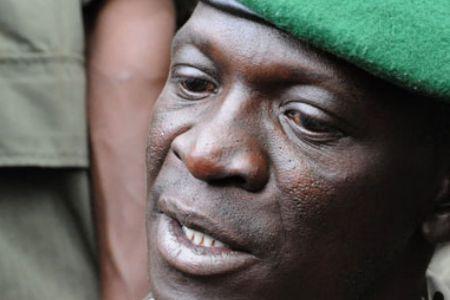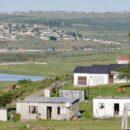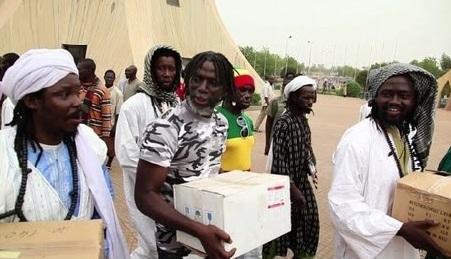Mali uncertainty as all sides wonder, “˜what next?’– By Camilla Toulmin


Captain Sanogo - Mali's military coup leader - faces difficult questions on the future trajectory of his regime.
Nearly a week has passed since a group of mid-level officers led by Captain Sanogo carried out a coup d’etat in Mali’s capital, Bamako. The army was deeply frustrated and angry with the sitting president’s seeming lack of appetite for going into battle with the Tuareg rebels in the north of the country, and a shortage of resources committed to equipment that might have allowed the army to be more effective in driving them back.
But today, one week on, the future of the country looks ever more uncertain.
Many Tuareg groups have sought greater autonomy, if not an independent state, since colonial times. There was a pre-independence proposal in the 1950s for a central Saharan state which would have grouped together all these people who felt foreign to the sub-Saharan peoples taking power in Bamako, Niamey and N’Djamena. Rumbling revolts in the north during 1960s and 1990s have been put down with a varying mix of force, political decentralisation and aid money.
On the fall of Gadhafi last year, thousands of well-armed, battle-hardened Tuareg and others returned home from Libya, determined to achieve their longstanding aim of independence. Creating the Mouvement National pour la Liberation de l’Azawad in October 2011, the rebels gained a series of victories against Mali’s army in January and February this year.
On their return from Libya, they also found an Al Qaeda presence scattered across the north of Mali and neighbouring Niger, stemming from the Salafist groups in southern Algeria. Responsible for a series of raids and kidnappings in Timbuctu, Gao and Niamey, Al Qaeda in the Islamic Maghreb (AQMI) has been targeted by US and French special forces working with the Malian government to monitor and restrain their movements. Currently, they are thought to be holding up to a dozen westerners somewhere in the desert.
A dangerous twist in events occurred in late January when the rebels took Aguel hoc, a town in the north, capturing 80 or more soldiers. A number of these were then murdered, hands tied behind their backs and throats slit. When news of this horrendous treatment of prisoners came out and photos were posted on websites, it generated huge shock and fury around the country. It remains unclear who was responsible – was it the MNLA, or was it AQMI? The former deny responsibility, but if it was AQMI, have they been fighting alongside the Tuareg?
Army widows and wives took to the streets of Bamako, and were joined by the population, outraged by such appalling treatment of their folk, then went on the rampage, ransacking and burning the houses and shops of anyone who looked like a Tuareg, leaving them to flee for their lives to neighbouring countries, losing all possessions.
So, for those in Mali, the political situation has been very worrying for some time. The government of President Toure was said to be playing a complex game with the rebels and elements in the administration were also implicated in a growing trade in drugs across the Sahara. Everyone in Bamako can tell you of the airliner that had crash-landed in the desert in 2010, stashed with drugs from South America, a source of big bucks for both security forces and rebels.
For the presidential candidates in full campaign for the first round of elections due on April 29th, the coup has come as a rude awakening to the fragility of their democratic institutions. Many of them are now engaged in discussions amongst themselves and with the regime, in the hope of setting up a transitional structure which can re-establish elected government as soon as possible. Some of those ousted and held under house arrest by Capt Sanogo have started a hunger strike. No-one knows where the President is, but it is hoped he is being protected by his elite bodyguard, somewhere in the country.
Meanwhile, what do we know of Capt Sanogo? Not a lot, except he has done several training courses in the US, and he gives the impression of not having thought through all the potential consequences of his actions. He may possibly be looking for a way out that will enable him to exit with honour from a role that does not sit comfortably with him.
Since the coup, the rebels have seized the initiative – not surprisingly – and plan to capture the northern half of this enormous country while Bamako is in disarray. Their sights are set on Timbuctu and Gao, from which it will be difficult and costly to dislodge them. Neighbouring north west Niger is increasingly affected and being drawn into the conflict.
Meanwhile, the US and France are caught between imposing cuts in military and development aid and expressions of disapproval for this unconstitutional action, and at the same time seething with frustration that both rebels and AQMI are gaining ground rapidly. It is said that a range of other interests have also got a finger in the pie, through support to one or other forces in play. And the possibility of major oil and gas finds in the northern region will only further competition by proxy.
From the first, the African Union, neighbouring states and the regional grouping ECOWAS have all condemned the coup and called for a rapid return to constitutional order, but it is difficult to know what more they can do. No-one is considering an intervention force to reverse the coup. Meanwhile, the flow of refugees to neighbouring countries will only grow, as the combination of conflict and last year’s poor harvest prompt an urgent search for safety and food. With more than 100,000 displaced before the coup, the figures are likely to balloon, pushing the Sahel into a major humanitarian emergency that has not been witnessed since the mid-1980s.
There are big questions about what might happen next. How rapidly can the coup perpetrators transmute into a transitional regime that has greater legitimacy, can re-start the democratic process and re-engage in the fight against the rebels? Or is negotiation with them the best route? Capt Sanogo seems to think the latter should work, but negotiating requires a strong position and a credible threat, both of which are missing from Bamako’s current stance. How will France and the US manoeuvre in the fight against AQMI with the current confusion in the north of the country?
Looking across the border to Senegal and the stable transfer of power from President Wade to Macky Sall, democrats in Mali have reason for sadness and despair. Perhaps from this crucible of frustration, anger and outrage can come a concerted push by Mali’s political leaders to live up to the proud tradition established by president Toure in 1991, when he overthrew military president Traore, and set up a transitional government that led to 20 years of electoral government. But there is much uncertainty about how things may pan out over the next few days and weeks.
Camilla Toulmin is Director of the International Institute for Environment and Development (IIED). She is on the council of the RAS.






Futher to the article above, I can identify four criteria for evaluating civic electoral prescriptice systems—the degree to which they promote:
• Political, governmental, and regime stability
• Accountability of elected officials
• High voter turnout
• Thorough deliberation of public policy
Elections perform two primary tasks in constitutional democracies.
• The first, long hallowed in liberal democratic theory, is to provide a means of popular control of government. John Locke, a political philosopher of individual rights and limited government (an approach known as “philosophical liberalismâ€), defined the legitimate powers of government in terms of popular consent:
“The constitution of the legislative [authority] is the first and fundamental act of society, whereby provision is made for the continuation of their union under the direction of persons and bonds of laws…by consent and appointment of the people, without which no one man, or number of men, amongst them can have authority of making laws that shall be binding on the rest.†John Locke 1690
Locke’s formulation is now accepted throughout much of the world—governmental legitimacy depends on popular consent.
The second function of the electoral system is far less obvious.
• Elections provide a means not only for the citizens to direct and control their government, but also for the government to direct and control the mass citizenry. By producing public acquiescence to the act of governing, elections empower governments to act. Elections also produce political order out of potential chaos.
Elections can be very worthwhile institutions. Elections stabilize and regularize popular participation in government, and can provide decisive results about which leaders will direct the government. Elections remain indispensable links between the public and government.
An electoral system’s central objectives must be political order, high voting participation, liberty and accountability.
Electoral systems have great consequences for the democratic qualities of any constitutional government.
First past the post offers the virtue of structural simplicity. In this system, elected officials individually win office in single-member districts by receiving more votes than do any rival candidates. It is a system with origins in Great Britain and is preferred in the English speaking world and among former British colonies.
Single-member plurality systems produces simplicity and also contributes to accountability by making it clear to the public who is in charge and who can be blamed.
Parliamentary systems with single-member plurality are more stable than those employing other electoral systems.
Does single-member plurality systems facilitate governmental deliberation? On balance, probably not—
• Single-member plurality makes candidate individualism possible, encourages a strong constituency orientation, and that, in combination with brief terms, encourages lawmakers to prefer a short-term responsiveness to local swing voters at the expense of long-term deliberation about the public good.
Advocates of Proportional Representative systems emphasize the fairness of the proportional results and the responsiveness of the broader range of representation in government. PR encourages multipartyism by setting relatively low vote thresholds for parties (such as 5%) to win representation in legislatures. Parties that would have no governmental role in plurality and majoritarian systems can hold great power in PR systems. This does generate more diverse viewpoints in government and more deliberation among a wider range of views, but at the cost of governmental stability and accountability. Governmental coalitions in PR systems can be complex and brittle—defection of a single party can cause a government to dissolve. Holding elaborate coalitions accountable poses challenges for voters. In legislatures with three or more parties—often as many as eight or ten—it is frequently not clear on election night which parties will coalesce to form a parliamentary majority that will govern the province.
A PR electoral system in Mali probably would produce multipartyism and more bargaining and deliberation among the multiple parties in the legislature. It would accentuate Malian diversity, producing longer governmental deliberations and perhaps less clear responsibility for policy outcomes. More diverse representation in the legislature might reduce political stability in Mali by increasing conflict along racial, ethnic, and regional lines.
PR might stimulate higher voter participation because each vote is more likely to matter in electing parliamentary representatives under a scheme of proportional allocation. In addition, lower thresholds for representation may require candidates and parties to broaden their electoral targeting to win office by attracting new voters. The rewards for mobilizing new voters are greater when each additional vote counts more in winning representation.
What sort of democracy is implicit in the reforms being advocated? My approach begins with a sober realization of the limited knowledge and interest most citizens have in the political process and procedure. Responsiveness cannot be a useful goal for our electoral system because the public has limited issue knowledge that can serve as a basis for enforcing responsiveness. Given an uninterested and uninformed public frequently possessing inconsistent policy preferences, elections cannot really function as exercises in public issue deliberation. The shortcomings of the initiative reveal the folly of demanding too much time and attention from the electorate for such matters. Social choice theory exposes the futility of defining elections as “meaningful†expressions of the public’s policy preferences. Elections do not make policy; elections elect leaders to deliberate over policy on our behalf. An electoral system must provide voters an effective method for holding these leaders accountable.
An electoral system will function well if we become realistic about what a civic electoral system can accomplish.
Monte R. McMurchy
Toronto, Ontario
Does Civil Resistance Work?—The Current Imbroglio in Mali
My contention is that nonviolent campaigns have a participation advantage over violent insurgencies, which is a crucial factor in determining outcomes. The moral, the physical commitment and social media informational barriers to participation are much lower for nonviolent resistance than for violent insurgency. Nonviolent resistance movements create much more durable and internally peaceful democracies than transitions provoked by violent insurgencies. Nonviolent resistance campaigns are more effective in getting results and, once they have succeeded, more likely to establish democratic regimes with a lower probability of a relapse into civil war. However, I am of the opinion that nonviolent campaigns fail to achieve their objectives when they are unable to overcome the challenge of participation, when they fail to recruit a robust, diverse and broad based membership that can erode the power base of the opposition adversary and maintain resilience in the face of repression. However, a peaceful successful post war society requires basic fundamental civil institutions by which to establish, create and enforce the ‘rule of law’ and to provide basic essential goods and services to the people.
Monte McMurchy
The Lessons and Limits of DDR in Africa with [future] reference to Mali
My seasoned opinion developed from participating in various DDR procedures in Africa and elsewhere leads me to the conclusion that the DDR element of most crucial fundamental salience is that of civil social “reintegration”. Positive Reintegration ought to entail cohesive prescriptive validated reintegration into society as fully participating economic social agents who must be considered [at all times] as a positive addition to the social and political capacity development of their respective nation state.
I believe and consider that all prior DDR efforts which entail the use of scarce resources, financial and other will be for the most part wasted and for naught; if proper positive prescriptive reintegration strengthening into societal active participation is lacking. Human capital ought not to be wasted as all human capital is of value and has the potential to create added value.
Monte McMurchy
Member UNDP Democratic Governance Roster For Electoral Systems
Member UNDP Expert Roster For Crisis Prevention and Recovery
Member UNDP Expert Roster For Parliamentary Development